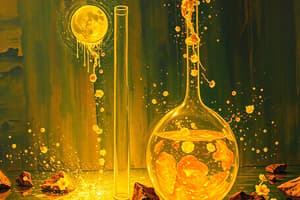Podcast
Questions and Answers
What is the solubility product constant?
What is the solubility product constant?
The solubility product constant is the tendency of solutions containing more than one solute to separate into different layers.
What are precipitation reactions in chemistry?
What are precipitation reactions in chemistry?
Precipitation reactions involve solid products called precipitates being produced by reacting soluble compounds together.
What is phase separation in chemistry?
What is phase separation in chemistry?
Phase separation is when solutions containing more than one solute separate into different layers.
What is a double displacement reaction in chemistry?
What is a double displacement reaction in chemistry?
What happens when two poorly soluble salts are mixed together in water?
What happens when two poorly soluble salts are mixed together in water?
How does copper(II) hydroxide behave in solution?
How does copper(II) hydroxide behave in solution?
What is the general effect of temperature on the dissolution of precipitates?
What is the general effect of temperature on the dissolution of precipitates?
How does pH impact the solubility of precipitates?
How does pH impact the solubility of precipitates?
How does ionic strength affect the solubility of sparingly soluble salts?
How does ionic strength affect the solubility of sparingly soluble salts?
Explain how the presence of common ions influences precipitation.
Explain how the presence of common ions influences precipitation.
Why does silver iodide precipitate when barium chloride reacts with silver nitrate?
Why does silver iodide precipitate when barium chloride reacts with silver nitrate?
How do silicates with high negative charge density behave in terms of precipitation?
How do silicates with high negative charge density behave in terms of precipitation?
Flashcards are hidden until you start studying
Study Notes
Precipitation Reactions
In chemistry, precipitation reactions involve solid products called precipitates being produced by reacting soluble compounds together. These reactions are reversible processes where dissolved substances can combine to form insoluble particles that settle out of solution. They often occur when two oppositely charged polar ionic compounds come into contact with each other and neutralize one another through electrostatic attraction.
Solubility Product Constant
The tendency of solutions containing more than one solute to separate into different layers is known as phase separation. For example, sodium sulfate and potassium chloride dissolve completely in water and do not cause it to crystalize, while copper(II) hydroxide crystallizes from a slightly acidic or basic solution. This phenomenon depends on many factors such as the nature of the components of the mixture, their concentrations, temperature, pressure, etc..
When two oppositely charged salts are mixed, they may undergo a double displacement reaction, also known as metathesis, which results in the formation of a pair of new salts whose aqueous solubilities differ greatly from those of the original salts involved in the reaction. If this process causes one or both of these salts to become less soluble in water, a precipitate forms. In most cases, if you mix equal amounts of two poorly soluble salts together in water, only one product will likely precipitate.
Factors Affecting Precipitation
The extent and rate of precipitation depend upon several variables including:
-
Ionic strength: As the concentration of ions in solution increases, the solubility of the sparingly soluble salt decreases due to increased competition between solutes for available sites on the surface of the particle.
-
Temperature: Most commonly, increasing the temperature favors the dissolution of the precipitate, following Le Chatelier's principle. However, there are some exceptions where higher temperatures favor precipitation.
-
pH: Changes in pH affect the species present in equilibrium, thus affecting the solubility of the precipitate.
-
Presence of common ions: Common ions compete with like ions from the forming salt for sites on the surface of the particle, causing changes in the position of equilibrium between the precipitate and its solution.
Examples of Double Displacement or Metatheses Reactions
Several examples illustrate double displacement or metatheses reactions resulting in precipitation:
-
Barium Iodide: When barium chloride (aq) reacts with silver nitrate (aq), silver iodide solidifies and precipitates because the solubility of silver iodide in water is less than that of barium chloride and silver nitrate combined.
-
Calculus Interference: Calcium carbonate interferes with calculi removal by creating a precipitate that obstructs kidney stones.
-
Silicate Minerals: Some silicates have high negative charge density, causing them to form large and often stable precipitates.
Summary
Precipitation reactions result in insoluble matter settling out of a liquid and accumulating in the liquid until it reaches saturation point. They play important roles in various chemical phenomena, including mineralogy, calcite formation in caves, corrosion, pollution control, and pharmaceuticals. Understanding these processes helps chemists develop environmentally friendly materials for industry applications and study natural systems involving precipitation reactions.
Studying That Suits You
Use AI to generate personalized quizzes and flashcards to suit your learning preferences.




